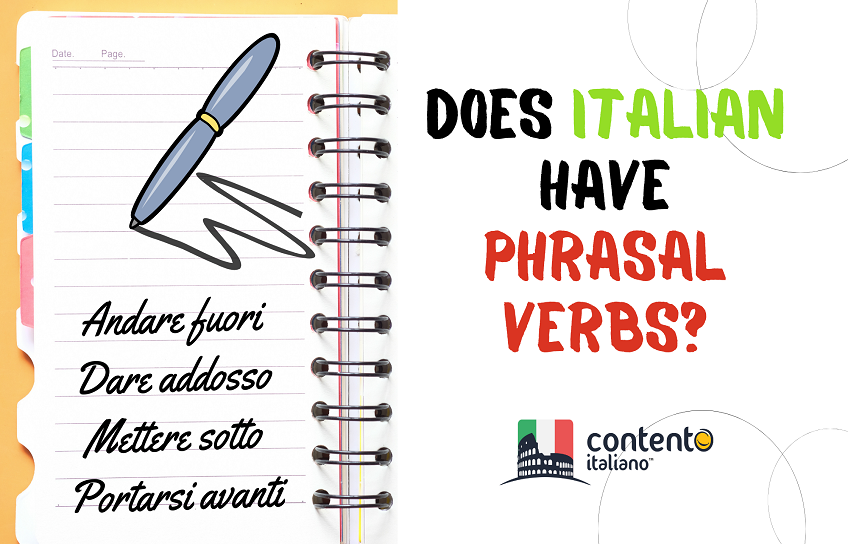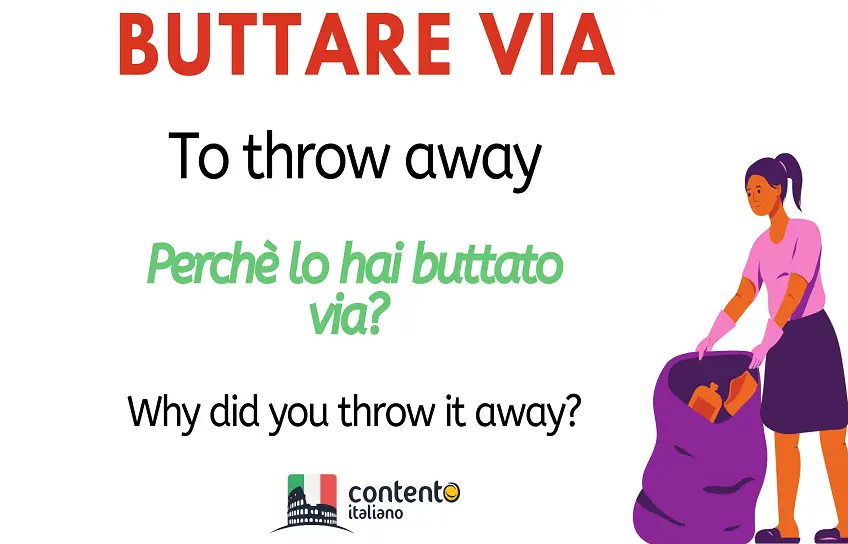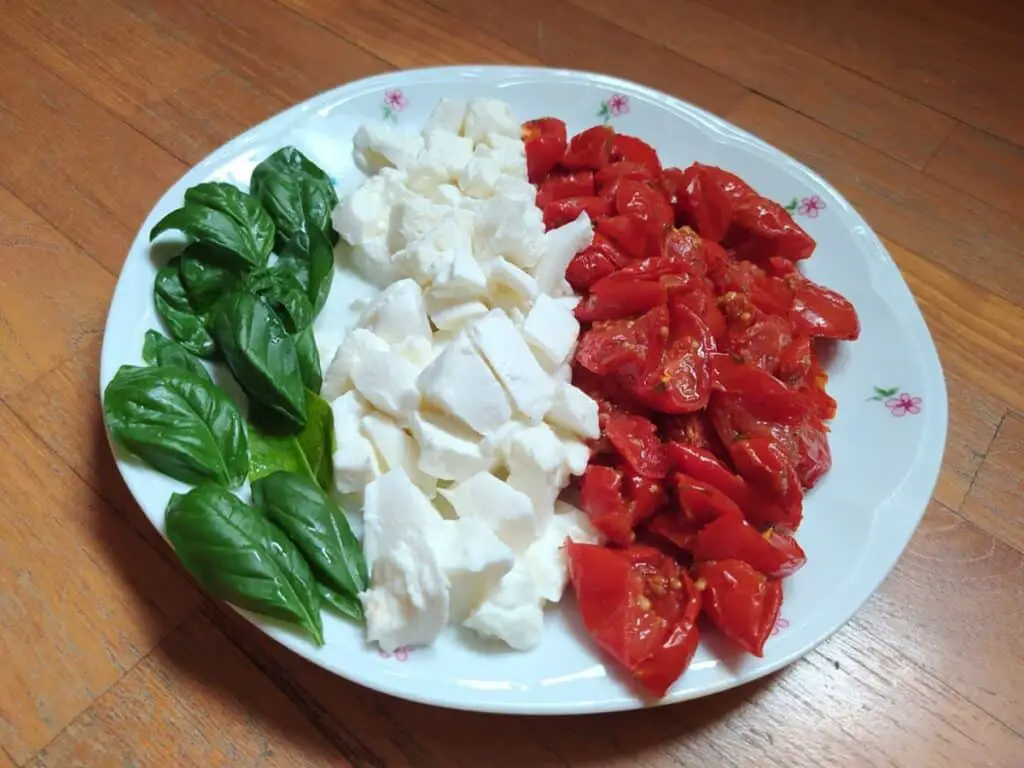Phrasal verbs are very common in English so, if you are a native English speaker who is learning Italian, you may be wondering if the Italian language has phrasal verbs.
The Italian language does indeed have phrasal verbs. Some of these, when translated literally, are very similar, if not identical to, English phrasal verbs and are easier to understand for an English speaker who encounters them for the first time. Some others have an idiomatic meaning and so, when translated literally, don’t correspond to a phrasal verb in English.
In this article you will find out how phrasal verbs are structured and you’ll get to learn how to use a number of popular Italian phrasal verbs.

What is a phrasal verb?
A phrasal verb is a verb that is made of two parts: a verb + a preposition (e.g. in) or adverb (e.g. down).
The preposition or adverb that follows the verb acts to change its meaning. For example “to give” on its own has a different meaning from “to give up”, “to give in” or “to give off”.
Examples of phrasal verbs in English are:
- To break down
- To take off
- To set up
The meaning of a phrasal verb is given by the combination of the verb and preposition/adverb.
How Italian phrasal verbs are made
Italian phrasal verbs are called verbi sintagmatici or also, more similar to English, verbi frasali, although the latter is more often used by Italian speakers when they refer to the English language.
Phrasal verbs are not as popular in Italian as they are in English, but they exist nonetheless and are very useful to convey a range of actions and feelings. Similar to English, Italian phrasal verbs are less formal than their non-phrasal counterparts.
Italian phrasal verbs are made in the same way as English and follow the formula:
Verb + preposition / adverb
It it worth noting that the majority of Italian phrasal verbs are made with adverbs, such as sotto (under), dietro (behind) or fuori (out), whilst the majority of English phrasal verbs are made with a preposition (such as in, up or off).
Interestingly, there are certain Italian phrasal verbs which are used in the dialects of Lombardia, Veneto and Emilia Romagna. These verbs are specific to these regions, and it is unlikely that they would be understood by Italians from other regions.
This is an example from the dialect of Lombardy:
Dà su = to apply (paint or oil)
As a native Italian speaker, if someone used this verb, I would not know what it means.
If you are on your Italian-learning journey, we suggest learning standard Italian, and using phrasal verbs which belong to standard Italian and so can be understood by all Italians.
Italian phrasal verbs with an idiomatic meaning
Some Italian phrasal verbs have an idiomatic meaning, that is, a meaning different to the literal meaning of the verb + preposition/ adverb combination.
Similar to English, these types of phrasal verbs don’t make sense when translated literally, and so, if you are a learner of Italian, you might find it a little tricky to understand what is being said the first time you encounter a verb like this.
The table below shows you both the literal translation and idiomatic meaning of some popular Italian phrasal verbs and puts them into context with examples:
| Italian phrasal verb | Literal translation | Idiomatic meaning | Example sentence | Alternative (non phrasal) verb – usually more formal |
|---|---|---|---|---|
| Andare dietro (a) | To go behind | To follow (figurative and literal)/ to court/ to fancy | Gli vanno tutti dietro – they all fancy him | Seguire /corteggiare |
| Andare fuori | To go out | To go nuts / to loose it | Quando gli hanno detto la verità è andato fuori – when they told him the truth he went nuts | Impazzire / esaurirsi |
| Andare sotto | To go under | To overdraw/ to be overdrawn (if using in the past tense) | Ha speso troppo ed è andata sotto – she spent too much and she went into overdraft | Andare sotto il limite |
| Buttare giù | To throw down | To dishearten/ to make someone depressed / to bring someone down | Le persone invidiose cercano sempre di buttarti giù – envious people always try to bring you down | Scoraggiare / deprimere |
| Dare addosso (a) | To give on top | To attack (either physically or verbally)/ to criticize | Il reporter gli ha dato addosso durante l’ intervista – the reporter attacked him during the interview | Aggredire/ infierire |
| Essere fuori | To be out | To be nuts/ to have a screw loose | Sei fuori?! – are you nuts?! | Essere pazzo/ essere instabile |
| Fare fuori | To do out | To take out/ to eliminate/ to kill/ to wipe out | Con la loro idea sono riusciti a fare fuori la competizione – with their idea they managed to wipe out the competition | Eliminare/ uccidere |
| Mettere addosso | To put on / to put on top | To make someone feel (a positive or negative feeling) | Questa musica mi ha messo addosso una grande gioia – this music made me feel great joy – note, the verb “mettere addosso” implies that you are still feeling the feeling because you “have it on” | Infondere/ fare provare… |
| Mettere dentro | To put in | To jail | Lo hanno messo dentro per spaccio di droghe – they jailed him for drug dealing | Imprigionare / mandare in prigione |
| Mettere sotto | To put under | To run over | Guidava troppo veloce e ha messo sotto un piccione – he/ she was driving too fast and ran over a pigeon | Investire |
| Mettersi sotto | To put oneself under | To get down to it / to start working hard on something | Si è messa sotto e ha finito il lavoro in una giornata – she got down to it and finished the job in one day | Impegnarsi / mettersi al lavoro |
| Mettere giu’ | To put down | To jot down | Ho messo giù un paio di pagine da farti vedere – I jotted down a couple of pages to show you | Scrivere una bozza / preparare |
| Portare avanti | To carry forward | To carry something out / to progress something | Sta portando avanti un progetto molto grande – he/ she is carrying out a very big project | Eseguire |
| Portarsi avanti | To carry oneself forward | To get ahead | Questa sera cerco di portami un po’ avanti – this evening I’ll try to get ahead a little | Avvantaggiarsi |
| Portarsi dietro | To carry behind for oneself | To carry / to be burdened by | Si porta dietro un grosso peso – he/ she carries a big burden | Avere |
| Mandare giù | To send down | To swallow (in a figurative sense) | È una cosa difficile da mandare giù – it’s a hard thing to swallow | Ingoiare / accettare |
| Tirare su | To pull up | To cheer up/ to raise / to build | Questo film mi ha tirato su – this film cheered me up | Rallegrare/ crescere / costruire |
| Tirare avanti | To pull forward | To make ends meet / to survive | La situazione non è ideale ma tirano avanti – the situation is not ideal but they are surviving | Sopravvivere / procedere faticosamente |
| Tirare fuori | To pull out | To come out with something | Qualche volta tira fuori delle storie assurde – sometimes he/ she comes up with some absurd stories | Dire / trovare |
| Tirarsi indietro | To pull oneself back | To pull back / to pull out | Si sono tirati indietro all’ ultimo minuto e hanno causato un sacco di problemi – they pulled out at the last minute and caused a lot of problems | Ritirarsi |
| Darci dentro | To give it in | To put a lot of concentrated effort into something | Ho deciso di darci dentro e cercare di recuperare – I decided to work hard and to try to catch up | Impegnarsi |
Italian phrasal verbs which are similar to English
Some Italian phrasal verbs, when translated literally, are very similar, or identical, to English phrasal verbs. For an English speaker it is very probably easier to understand these verbs and make sense of them.
Here is a list of Italian phrasal verbs which are similar to English phrasal verbs:
- Buttare fuori = to throw out / to kick out
Facevano troppo rumore e così li hanno buttati fuori
They were making too much noise and so they kicked them out
- Buttare via = to throw away
Perchè lo hai buttato via?
Why did you throw it away?

- Dare via = to give away
Ho deciso di dare via tutte le cose che non uso
I’ve decided to give away all the things I don’t use
- Andare contro = to go against
I suoi genitori, anzichè supportarla, gli vanno contro
Instead of supporting her, her parents go against her
- Dormirci su = to sleep over it
Ho deciso di rimandare la decisione e di dormirci su
I’ve decided to put off the decision and to sleep over it
- Mettere su = to put up / to create/ to put something together/ to start
Stanno pensando di mettere su famiglia
They are thinking about starting a family
- Portare via = to take away
Hanno portato via tutto
They took everything away
- Mettere via = to put away / to save
Questo mese non siamo riusciti a mettere via niente
This month we didn’t manage to put anything away
- Venire giù = to come down
Vieni giù?
Are you coming down?
- Tirarsi fuori = to pull oneself out
Non so come tirarmi fuori da questo casino
I don’t know how to pull myself out of this mess
- Mettersi insieme = to put oneself together (meaning “to get together” – of relationships)
Si sono messi insieme l’ estate scorsa
They got together last summer

- Andare giù = to go down (in mental and physical health or quality)
Negli ultimi anni questo quartiere è andato sempre più giù
In the last years this neighbourhood went down further and further
Italian phrasal verbs: take-home messages
Here is a summary of key points about Italian phrasal verbs:
- Italian phrasal verbs are not as common as in English but they are widespread nonetheless and useful to express a variety of actions and feelings
- Italian phrasal verbs are more informal than their non-phrasal counterparts
- Some Italian phrasal verbs can be translated into English literally and make sense. For example mettere via -“to put away”. Some phrasal verbs have an idiomatic meaning and won’t make sense when translated literally into English.
- Unless you know all Italian phrasal verbs by heart, you might find yourself in a situation where you struggle to understand whether a phrasal verb has an idiomatic meaning. Use the context of the sentence to help you figure out what the speaker is saying.





